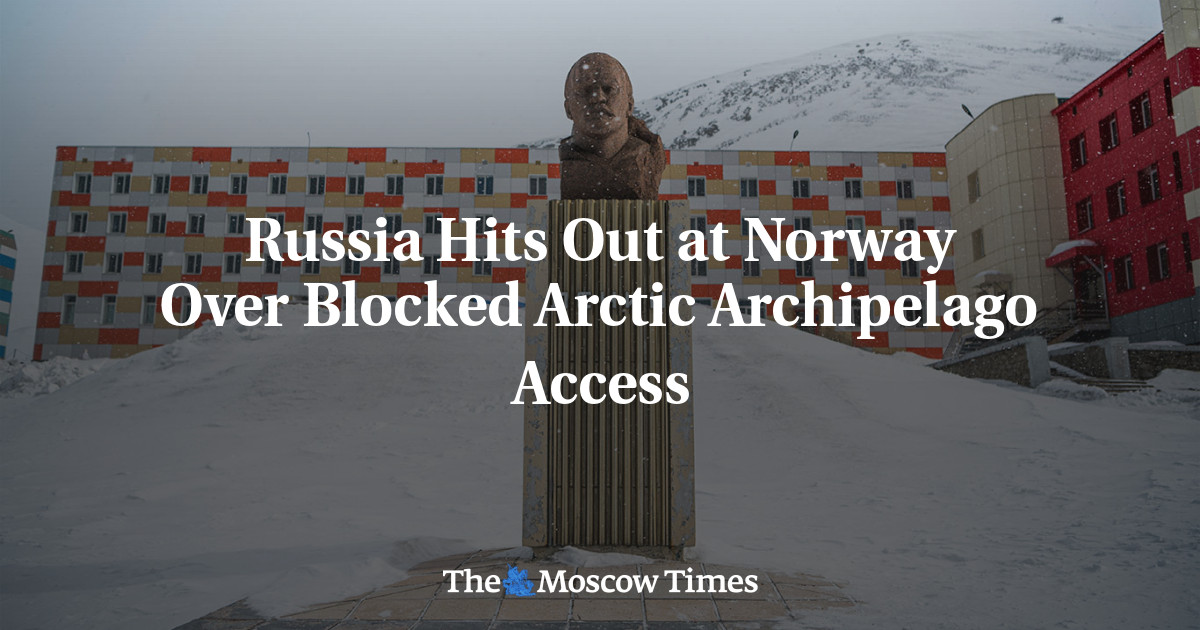
Russian officials have voiced outrage and threatened retaliation after they said Norway blocked a shipment of essential goods, including food and medical supplies, destined for Russian miners on the Svalbard archipelago.
Norwegian authorities last month stopped two containers carrying 20 tons of Russian goods, including seven tons of food, at its sole land border checkpoint with Russia, local Norwegian media reported.
The shipment was reportedly headed for Barentsburg, the Arctic archipelago’s second-largest settlement, where some 400 people work for Russian state-owned coal mining company Arktikugol.
“Following Norway’s actions, the sovereignty of this country over Svalbard is a big question from now on,” Russian Senator Andrei Klishas said on the Telegram messaging app Wednesday.
Norway’s Foreign Ministry denied Arktikugol’s request to open a supply route to Barentsburg, citing sanctions on Russia over its invasion of Ukraine, said Konstantin Kosachev, who heads the upper-house Federation Council’s Foreign Affairs Committee.
The Svalbard archipelago is under full Norwegian sovereignty.
But Norway’s actions, Kosachev claimed, “violated the provisions” of the Svalbard Treaty of 1920, which grants citizens of all signatory nations, including Russia, equal access to the archipelago’s resources.
“With their forceful decision, the Norwegian authorities are trying to leave the Russian miners without food, which is inherently immoral. It violates human rights and the principles of humanism,“ he said.
Russia’s Foreign Ministry said it summoned Norway’s charge d’affaires to protest the blocking of “critical” shipments for its Svalbard workers, including “food, medical equipment and construction materials,” at the Russian-Norwegian border.
“We indicated that unfriendly actions against Russia will inevitably lead to appropriate retaliatory measures,” the ministry’s statement said.
Russia will most likely resort to its usual diplomatic measures — like political or economic sanctions and expulsions of diplomats — in its response, Nikolai Doronin, board chairman of the Project Office for Arctic Development, told The Moscow Times.
“Russia and Norway have suspended almost all projects [together]. Norway is self-sufficient, so I don’t see any direct retaliatory measures that could harm Norway. But of course, this incident will harm the relations between the two neighbors,” Doronin said.
Oslo closed its seaports and land border to Russian shipping in early May under EU sanctions imposed on Moscow following the Kremlin’s full-scale invasion of Ukraine.
If the border transit issues continue, essential goods for Svalbard’s Russian workers will have to be delivered by sea from the Russian port of Murmansk.
“Of course, there are different routes to deliver cargo to the archipelago, but they are more expensive. Due to the harsh climatic conditions, the logistics are very hard. That’s why the Russian side asked for an exception to supply its own people located in those remote territories,” said Doronin.
Russia’s Consul General to Norway Sergei Guschin said Russia and Norway are currently holding talks on resolving the shipment issue, adding that Oslo likely didn’t realize that it was blocking the shipment from reaching Svalbard by halting it at the land border.
Yet Alexander Veselov, the head of Arktikugol, said a number of shipping companies from other countries have refused to deliver the cargo due to unprofitability.
In a letter to Norwegian authorities, Veselov warned that the shipping problems could lead to a “humanitarian emergency.”